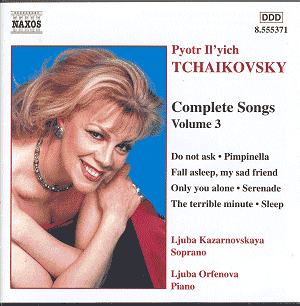Pyotr Ilyich TCHAIKOVSKY
(1840-1893)
Songs: from Op. 6, Op. 28, Op. 38, Op. 47, Op. 57, Op. 63
1. Both painfully and sweetly, Op. 6 No. 3
2. My genius, my angel (without Op. No.)
3. Only you alone, Op. 57 No. 6
4. Do not ask, Op. 57 No. 3
5. Death, Op. 57 No. 5
6. No, only he who has known, Op. 6 No. 6
7. Why?, Op. 6 No. 5
8. The first meeting, Op. 63 No. 4
9. Not a word, O my friend, Op. 6 No. 2
10. Pimpinella, Op. 38 No. 6
11. Sleep, poor friend, Op. 47 No. 4
12. I opened the window, Op. 63 No. 2
13. The fires in the room were already out, Op. 63 No. 5
14. Serenade, Op. 63 No. 6
15. Why did I dream of you?, Op. 28 No. 3
16. I do not please you, Op. 63 No. 3
17. Do not believe, my friend, Op. Op. 6 No. 1
18. The fearful minute, Op. 28 No. 6
19. Sleep, Op. 57 No. 4
20. I did not love you at first, Op. 63 No. 1
21. On the golden cornfields, Op. 57 No. 2
 Lyuba Kazarnovskaya
(soprano) Lyuba Kazarnovskaya
(soprano)
Ljuba Orfenova (piano)
Rec 1st-7th August 1999, Malya Hall, Moscow Conservatory
 NAXOS 8.555371 [69.47] NAXOS 8.555371 [69.47] |
 |
Crotchet
AmazonUK
AmazonUS
Amazon
recommendations
Despite the popularity of his symphonies and other orchestral compositions,
Tchaikovsky's priority was always the theatre. He was also a committed song
writer, with more than a hundred examples to his credit, and his songs often
have an operatic style. This collection is Volume 3 in a project to record
them all. It includes the composer's most celebrated song: No, only he
who has known, Opus 6 No. 6 (known in the West as None but the lonely
heart).
Tchaikovsky's concerns as a song writer are those we would expect of so romantic
an artist: sensitivity to the text, to capturing charming 'local' situations,
and above all, to releasing the dramatic intensity of emotional moods.
Ljuba Kazarnovskaya is an artist who comes to this recording with impressive
credentials, having performed the Russian repertory around the leading opera
houses of the world: the New York Metropolitan, La Scala in Milan, and London's
Covent Garden. And she certainly sounds very Russian stylistically; there
is nothing anodyne about her performances here.
One of Kazarnovskaya's great strengths is the way she can change the scale
of her approach. Compare, for instance, two songs whose titles indicate the
extremes of range covered in this recital. Opus 28 No. 3, Why did I dream
of you?, generates a marvellous emotional intensity, with a powerfully
built climax releasing a flood of tension. On the other hand, Opus 63
No. 2, I opened the window, is a gentle ballad, whose charming domesticity
is enhanced by the singer's tender delight in the homely context. Such things
can only be achieved through an artistry founded upon a sure and developed
technique, and Kazarnovskaya has these things in abundance.
If I find the more intimate, withdrawn side of Kazarnovskaya's performances
the more satisfying, that has a lot to do with the recording. She is given
a really firm focus by the engineers, very much to the front of the perspective,
and even to the extent of a certain fierceness in climaxes. On the other
hand, the piano accompaniments of Ljuba Orfenova are always in the background,
in what seems a different acoustic altogether, somewhat diffuse and lacking
definition. Somehow Tchaikovsky and the artists survive this obvious limitation,
but the situation is not ideal and some of the composer's subtleties are
certainly lost.
On the credit side can be added the excellent documentation found in the
accompanying booklet. There is a useful, carefully prepared introductory
essay by Keith Anderson, as well as full texts and translations of all the
songs, which are clearly printed and carefully laid out on the page. As for
the programme itself, this works well enough as a recital, presumably reflecting
an order chosen by the artists as if they were giving a live recital. But
I wonder how appropriate it is for the longer term needs of collectors, for
whom being able to find individual items becomes more of a priority. Surely
it would have been better to group the songs in their collections, as originally
published? In any case, Tchaikovsky's first song, My genius, my angel
(which pre-dates the opus numbers), is here wrongly listed as Opus 6 No.
3.
Terry Barfoot
|
|

